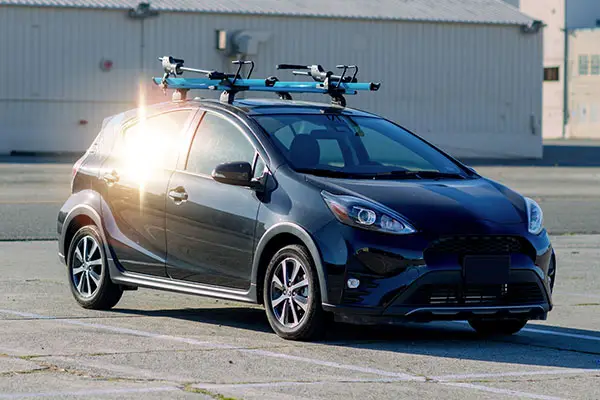This post contains affiliate links.
Turo is a popular peer-to-peer car sharing service. With Turo, private vehicle owners can easily rent out their vehicles. For those renting the cars, Turo’s website will allow them to customize aspects of their trip. This includes the car that is rented, the duration of the journey, and more. These selections can impact the price of your trip.
When booking a vehicle on Turo, an overall trip price will be quoted. Your trip fee, however, is a percentage of this total price. The higher a vehicle’s value, the higher this fee will be. The journey’s duration and the booking’s lead time also impact the trip fee.
In this article, we’ll be explaining why Turo charges a trip fee. To fully understand this fee and how it is calculated, you’ll need to understand the various factors that impact it. Luckily, we’ll be breaking this down for you. Not only will this explain why the fee is charged, but it will reveal how you can reduce this fee!
Why Does Turo Charge A Trip Fee?
Turo is a popular online service where private vehicle owners can rent out their cars! This is all done through a peer-to-peer digital interface. This is accessible via the official Turo website and their dedicated mobile applications. There are various cars and destinations to choose from when setting up your ride.
Depending on your selections, you’ll be quoted a trip price for your rental. When you’re booking a vehicle, there will be an itemized list of the various charges made by Turo. This allows users to conveniently select and deselect specific options. For example, this will include fees to accommodate smoking or pets.
When you take a look at these chargers, you’ll notice that there is a trip fee is charged by Turo. You might be wondering what this fee is for and why it is charged. When it comes down to this, the trip fee should not be confused with the trip price. There is a clear distinction between these on Turo’s website.
As we discussed above, your trip price is how much your trip will cost overall when all the optional and non-optional fees are added up. Here, optional fees refer to those to accommodate pets or smoking. Non-optional; fees, however, are those that apply to every rental – such as the trip fee.
There are many standard Turo fees that apply to all bookings. However, these depend on different aspects, such as which protection plan you choose. Your arrangements for collection and drop-off are also non-optional but may vary depending on specific details.
Your trip fee is another non-optional fee that applies to all rentals made using Turo. Essentially, your trip fee is a uniquely calculated percentage of your overall trip price. Once again, your specific trip fee for a rental will fluctuate depending on certain factors.
In the next section, we’re going to explain the factors that determine a Turo user’s trip fee.
3 Factors That Impact Your Turo Trip Fee
As we explained earlier, your trip fee is only a percentage of the overall price you pay for a rental on Turo. While this fee applies to all bookings made through this peer-to-peer service, the fee itself varies between different trips. Of course, the reason the Turo trip fee fluctuates is due to certain factors.
By considering these factors, you’ll have a better understanding of why the trip fee is charged by Turo. You’ll also understand why this fee may be higher for certain bookings than others. Let’s take a look!
#1: The Vehicle’s Estimated Value
When you visit the official Turo website, you’re immediately presented with plenty of different car brands. From BMW to Tesla, there are plenty of great brands to choose from. In fact, you can even set your preference to narrow down options when finding the right rental for your trip.
However, while there are plenty of luxury brands to choose from, your choice of vehicle can influence your trip fee. A general rule of thumb can be kept in mind when selecting your car. The higher the estimated value of your rental vehicle, the higher your trip fee will be.
For those trying to reduce their overall trip fee and price, selecting a vehicle with a lower value can help reduce costs. However, the car’s value is only one of the factors that influence your trip fee. Let’s consider the other factors that determine your trip fee!
#2: The Trip’s Duration
Another factor that impacts your Turo trip fee is the duration of your trip. Of course, this is one of the key selections you will have to make when arranging for a car rental with this service. Understanding how the duration of your trip influences your trip fee is crucial when understanding how this fee is calculated.
For shorter rides, a higher trip fee will be calculated. For longer trips, however, this fee is significantly reduced. This is a critical aspect to keep in mind when booking your rental car through Turo. If you want to reduce your trip fee, you might want to increase the duration of your rental!
#3: Your Booking Lead Time
The final factor that influences your trip fee is your lead time when renting a vehicle. Of course, this refers to how far in advance you make your booking. By booking further in advance, you can drastically reduce your trip fee. However, for last-minute trips, Turo users should expect their trip fee to be higher. Of course, this factor works in conjunction with those discussed above.
Conclusion
When arranging a car rental through Turo, you will be quoted a price for your trip. Of course, the trip price will depend on your specific selections while booking. Your trip fee, however, is a calculated percentage of your overall trip cost. This fee is influenced by three different factors.
Firstly, the higher the rental car’s value, the higher your trip fee will be. The duration of your trip will also play a crucial role, with longer rentals costing less than shorter trips. The final factor, of course, is the timing of your booking. By booking further in advance, Turo users can get a lower trip fee!


